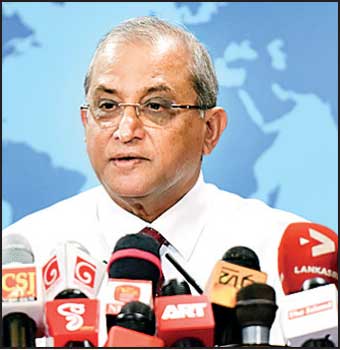Sunday Feb 15, 2026
Sunday Feb 15, 2026
Friday, 23 August 2024 00:24 - - {{hitsCtrl.values.hits}}
 |
| Udaya R. Seneviratne |
In a major move to address salary disparities and enhance the livelihoods of public service employees, the Expert Committee on Public Service Salary Disparities, Chaired by Udaya R. Seneviratne yesterday announced that the basic salary of public servants will see a substantial increase.
He said the hike will be a minimum of 24% for primary-level service categories, with overall salary increments ranging from 24% - 50% depending on fiscal feasibility.
The initiative comes in response to past trade union protests and the ongoing challenges faced by public servants amidst prevailing inflation and economic conditions.
As part of the new salary structure, employees in the primary-level service category will see their basic salary rise to Rs. 30,000 with a total monthly income, including the cost of living allowance, reaching Rs. 55,000.
In addition, Seneviratne announced that a cost of living allowance of Rs. 25,000 will be provided to all Government employees for three consecutive years starting from January next year, with 2025 being considered the base year.
According to him, this allowance will remain unchanged for the duration of the period, providing much-needed financial stability for public servants.
“The public service plays a vital role in the development of Sri Lanka, acting as the driving force behind the country’s progress. These restructuring efforts are prioritised to address the current challenges in the public sector and ensure a satisfied and motivated workforce,” Seneviratne added.
The proposals, which received approval from both the Cabinet and the Treasury, include provisions for pensioners as well. Starting January 2025, pensioners will receive a cost of living allowance of Rs. 12,500 each. Additionally, salary increments claimed by Government officials who retired prior to 2020 will be awarded, with corresponding adjustments made to their pensions.
Looking forward, he said the Government plans to conduct a scientific work study in 2025 to assess the effectiveness and efficiency of the public service. This study will form the basis for a comprehensive program aimed at restructuring the public service, with a focus on introducing Key Performance Indicators (KPIs) and a performance-based system for salary increments and non-financial benefits.
In a bid to modernise and digitise the public service, the government’s capital investment program for E-Governance will prioritise the integration of technology across all Government Ministries and institutions.
This initiative is also starting in 2025, will begin with Grama Niladhari offices and is expected to significantly enhance the performance of revenue-generating institutions and public service providers.
As part of the restructuring efforts, Seneviratne said identified public institutions will transition from their traditional departmental model to an innovative enterprise model.
“These institutions will be transformed into Public Quoted Companies with a democratic governance structure.
Ownership will be divided as 30% Government shares, 30% investor shares, 30% public shares through stock market listing and 10% employee shares,” he added.
Government officials eligible for pensions and assigned to these newly structured institutions will have their pensions deferred until they reach the age of 60, but will receive other benefits during their tenure.
Seneviratne also announced that measures will be introduced to optimise the delivery of certain government services by outsourcing these services to external providers. This approach aims to reduce Government expenditures and encourage private sector involvement. It will help avoid unnecessary recruitment in the Public Service and enable private providers to offer more effective services. As a result, economic services will be expanded.
To ease the financial burden on Government employees, the Agrahara Medical Insurance Scheme will be restructured to lower their health expenses. The plan is to maximise benefits through the scheme, with each government employee, including pensioners, contributing Rs. 1,000 per month.
Additionally, the National Insurance Trust Fund, which administers the Agrahara scheme, will enhance medical services for government employees. This will involve modernising the national hospital system and gradually upgrading selected government hospitals with special amenities for employees.
“Due to the high demand for Sri Lankans abroad, many are migrating for employment and higher education, drawn by the country’s reputation for free education and skilled human resources. As a result, Sri Lanka loses valuable talent and significant foreign exchange is spent on overseas education. A large number of eligible students miss out on opportunities to study at State universities due to limitations in free higher education, forcing parents to cover high costs for private institutions and international universities. The trend of university students leaving the country is increasing due to insufficient economic benefits,” he pointed out.
To address these issues, the committee has proposed to secure free higher education, grant legal and administrative independence to universities, and offer affordable courses by effectively utilising physical and human resources.
This will develop additional revenue streams and benefit all stakeholders. By improving this system and integrating with foreign universities and training institutions, Sri Lanka could become a Centre for Knowledge, expanding opportunities for international students to complete their education in Sri Lanka and becoming a leading sector for foreign exchange earnings.
Sri Lanka has achieved a notable position in health indicators due to its establishment of free health services, leading to increased international recognition for its healthcare services and professionals. However, the migration of health professionals is rising due to international demand. To address this, there is potential to transform Sri Lanka into a centre for internationally recognised health services by elevating the quality of free healthcare provided.
Strategies will be developed to deliver healthcare to both local and foreign communities efficiently and economically. This includes managing free healthcare facilities securely and introducing healthcare innovations that leverage existing physical and human resources.
Similarly, Ayurvedic medical services can be enhanced to generate economic benefits. It is proposed to capitalise on Sri Lanka’s potential to become a leading centre in healthcare-based tourism.